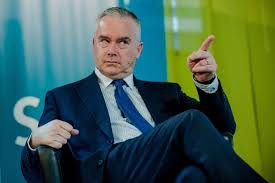- ‘Lies, damned lies etc…’ - 13th February 2026
- Missing in action - 12th February 2026
- Travel news again - 11th February 2026
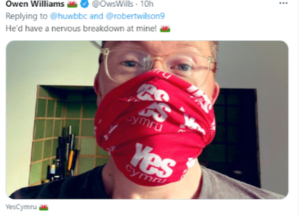 We can reveal how a contentious Welsh television newsreader has effectively endorsed an independence group where the founder resigned, amid accusations that it is in complete disarray over an extraordinary internal battle about transgenderism, with one supporter tweeting that there is “fear for the movement”, and he is seemingly flouting BBC rules on neutrality by doing so.
We can reveal how a contentious Welsh television newsreader has effectively endorsed an independence group where the founder resigned, amid accusations that it is in complete disarray over an extraordinary internal battle about transgenderism, with one supporter tweeting that there is “fear for the movement”, and he is seemingly flouting BBC rules on neutrality by doing so.
On Tuesday Huw Edwards (who ‘earns’ £425,000 a year) controversially ‘liked’ a tweet from a Welsh nationalist wearing a YesCymru (YC) face mask, yet the corporation guidelines seem clear in forbidding the endorsement of headline-grabbing issues.

The tweet Mr Edwards ‘liked’ was from Owen Williams who is on the Royal Television Society (RTS) Cymru committee, where he is described online in this way: “Owen has a formidable background in social media, having led Editorial Strategy at BBC Content Social, and previously as Head of Social at BBC One and BBC Wales”.
However the BBC rules appear unequivocal, and state: “If your work requires you to maintain your impartiality, don’t express a personal opinion on matters of public policy, politics, or ‘controversial subjects’”.
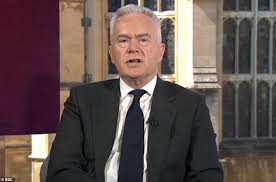
Earlier Mr Edwards had also ‘liked’ a tweet proclaiming he should be “President of an Independent Cymru”, once again apparently flying in the face of the rules on impartiality that have been emphasised by his superior, the BBC’s Director General Tim Davie.
In ‘liking’ the ‘poll’ tweet, Mr Edwards had once again in effect validated it – but it was a highly-questionable supposed ‘survey’ where he had been ‘voted’ top to become leader of an independent Wales.
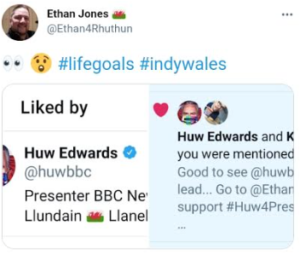 The whole concept of Welsh independence is extremely questionable, with samples from voters showing that most in Wales oppose it.
The whole concept of Welsh independence is extremely questionable, with samples from voters showing that most in Wales oppose it.
The BBC directives also say that staff should avoid using disclaimers such as ‘My views, not the BBC’s’ in their biographies and profiles, as they provide no defence against personal expressions of opinion.
This is not, though, the first time that Mr Edwards has made his Welsh nationalist views plain, putting BBC regulations centre stage.
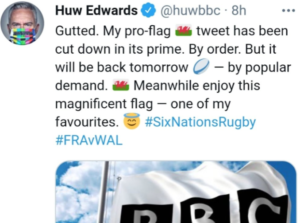 He was ordered to drop a post of himself in front of a Welsh flag, which he declared ironically was a “backdrop for @BBCNews at Ten”, and responded (again ironically): “Gutted my pro-flag tweet has been cut down in its prime. By order. But it will be back tomorrow – by popular demand. Meanwhile enjoy this magnificent flag – one of my favourites. Hashtag SixNationsRugby Hashtag FRAvWAL” – with a series of emojis included.
He was ordered to drop a post of himself in front of a Welsh flag, which he declared ironically was a “backdrop for @BBCNews at Ten”, and responded (again ironically): “Gutted my pro-flag tweet has been cut down in its prime. By order. But it will be back tomorrow – by popular demand. Meanwhile enjoy this magnificent flag – one of my favourites. Hashtag SixNationsRugby Hashtag FRAvWAL” – with a series of emojis included.
This tweet by Mr Edwards, came after a flurry of pro-Wales activity on his Twitter page before an international rugby match against France, when he stepped in following the performance of the Welsh rugby team being criticised in The Daily Telegraph.

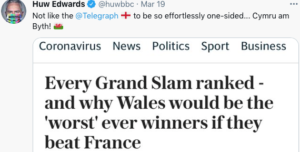 “Every Grand Slam ranked – and why Wales would be the ‘worst’ ever winners if they beat France”, ran the newspaper’s headline, to which Mr Edwards responded with heavy irony: “Not like the @Telegraph to be so effortlessly one-sided… Cymru am Byth!”
“Every Grand Slam ranked – and why Wales would be the ‘worst’ ever winners if they beat France”, ran the newspaper’s headline, to which Mr Edwards responded with heavy irony: “Not like the @Telegraph to be so effortlessly one-sided… Cymru am Byth!”
Before the gripping game a supporter of his, shared a series of pictures on Twitter (including one of Mr Edwards being licked by his dog), which he showed his approval of, by saying: “Share the love this epic thread was the tonic I needed – before kick off”.
However his announcements have not been met with wild acclaim by the leader of the Welsh Conservatives in the Welsh Parliament/Senedd Cymru (WP/SC) Andrew RT Davies, who has said on Twitter that The BBC was: “Employing presenters who openly mock… (Britain)… Ridiculous!”, and linked it to the ‘Gutted’ post.
 These messages fall into a familiar pattern, though, and in an earlier post Mr Edwards had endorsed, too, an opinionated columnist who said she was a “Welsh woman” and that the BBC Proms made her feel like a “foreign tourist”.
These messages fall into a familiar pattern, though, and in an earlier post Mr Edwards had endorsed, too, an opinionated columnist who said she was a “Welsh woman” and that the BBC Proms made her feel like a “foreign tourist”.
He had backed headline-grabbing writer and academic Laura McAllister’s Twitter announcement that there was less than two months before she stood for election to a football governing body’s council.
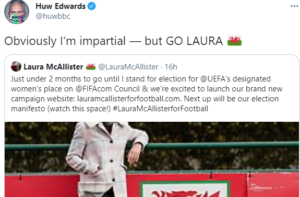 Mr Edwards proclaimed, initially again ironically: “Obviously I’m impartial —- but GO LAURA” with a Welsh flag after the comment.
Mr Edwards proclaimed, initially again ironically: “Obviously I’m impartial —- but GO LAURA” with a Welsh flag after the comment.
But more than six years ago (well before the row over how the proms are presented), Ms McAllister had written in her regular Welsh newspaper column: “I do realise that my national identity has been shaped and expressed largely through sport, but the Proms’ Union Jack waving (albeit with a smattering of European, Welsh and Scottish flags mixed in) and Rule Britannia make me feel like a foreign tourist”.
However by supporting Ms McAllister so publicly, using social media to endorse an independence movement, and emphasise his defence of all things Welsh, Mr Edwards may have posed a dilemma for his overall boss, Mr Davie, who was clear in his guidance that issues of neutrality are paramount – especially when impartiality is under attack worldwide.
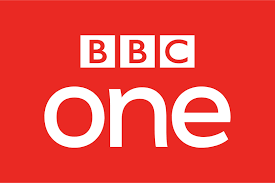
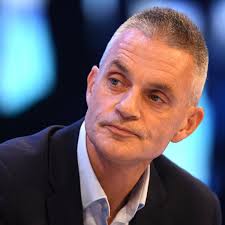
Mr Davie will be aware of the pressure he is under because of recent (reputable) opinion polls, and that it is crucial his presenters are neutral, because, in Mr Edwards’ case, some may disagree with his views on Wales, and they do, of course, pay his wages.
Recent comments on social media, though, are not the only ones where Mr Edwards’ views have been on public display.
He was accused of political bias, after he ‘liked’ a tweet saying: “Vote Labour for the National Health Service”.
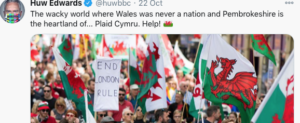 Another Tweet he published again seemed to go against the guidelines, highlighting as it did (once more ironically): “The wacky world where Wales was never a nation and Pembrokeshire is the heartland of… Plaid Cymru. Help!”.
Another Tweet he published again seemed to go against the guidelines, highlighting as it did (once more ironically): “The wacky world where Wales was never a nation and Pembrokeshire is the heartland of… Plaid Cymru. Help!”.
The picture he attached underneath it, was of protesters carrying Welsh flags aloft with a placard of END LONDON RULE clearly visible near the centre of the photograph.
![]() He attacked a critique of the break-up of the UK by celebrated historian and journalist Max Hastings. Mr Edwards tweeted that there were “errors”.
He attacked a critique of the break-up of the UK by celebrated historian and journalist Max Hastings. Mr Edwards tweeted that there were “errors”.
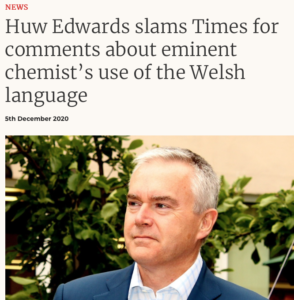 His comments in support of Wales, or endorsing Labour policies, are often seized on by a nationalist website which is backed by the taxpayer.
His comments in support of Wales, or endorsing Labour policies, are often seized on by a nationalist website which is backed by the taxpayer.
After Mr Edwards’ diatribe opposing Mr Hastings, the website Nation.Cymru (NC) published a ‘news’ piece saying: “Huw Edwards slams former Telegraph editor for anti-Welsh language article”, and it has ‘reported’ many ‘stories’ about his exploits.
Following the remark about Welsh nationalist party Plaid Cymru (PC), it ran a ‘story’ that: “Broadcaster Huw Edwards has protested the BBC’s new rules on using social media by unleashing a cascade of Welsh flags”.
 But the founder and former Editor of NC, Ifan Morgan Jones, is himself controversial and a firm supporter of PC.
But the founder and former Editor of NC, Ifan Morgan Jones, is himself controversial and a firm supporter of PC.
He has been in trouble for accepting an advert from the Bangor University (BU) journalism course that HE teaches on, which critics claimed was a blatant conflict of interest. They have also stressed the disturbing fact that teaching ‘journalism’ in this context appears odd when being unbiased is an important part of reporting news.

One NC ‘news’ piece said that: “The county of Gwynedd in the north-west has seen the largest collapse in consumer spending as a result of Covid-19 in both Wales and England, according to business data”, while another attacked the concept of second homes.
Yet one aggrieved writer hit back and said: “I am genuinely concerned by the amount of vitriol that comes out in the comments on the Nation.Cymru posts, and it makes me feel that we are uncomfortably close to the political posturing of 1930s Berlin”.
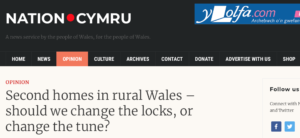 The article on NC criticising the concept of second homes, also appeared to have the Covid-19 lockdown in its sights, and began: “If it’s ‘coronavirus holiday’ season in rural Wales, the forecast is frosty for second home owners”, adding: “From spreading the virus and skipping lockdown to unfairly claiming business relief, second home owners have had bad pandemic press”.
The article on NC criticising the concept of second homes, also appeared to have the Covid-19 lockdown in its sights, and began: “If it’s ‘coronavirus holiday’ season in rural Wales, the forecast is frosty for second home owners”, adding: “From spreading the virus and skipping lockdown to unfairly claiming business relief, second home owners have had bad pandemic press”.
 There may also be bad press following The Eye’s disclosure that Mr Edwards effectively endorsed an independence group where the founder resigned, when it is in complete disarray over an extraordinary internal battle about transgenderism, with one supporter tweeting that there is “fear for the movement”, and he is seemingly flouting BBC rules on neutrality by doing so.
There may also be bad press following The Eye’s disclosure that Mr Edwards effectively endorsed an independence group where the founder resigned, when it is in complete disarray over an extraordinary internal battle about transgenderism, with one supporter tweeting that there is “fear for the movement”, and he is seemingly flouting BBC rules on neutrality by doing so.
Our Editor Phil Parry’s memories of his astonishing decades-long, award-winning career in journalism, which includes his 23 years with BBC Cymru Wales (when impartiality was all-important), as he was gripped by the incurable neurological disabling condition Hereditary Spastic Paraplegia (HSP), have been released in a major book, ‘A GOOD STORY’. Order the book now!








